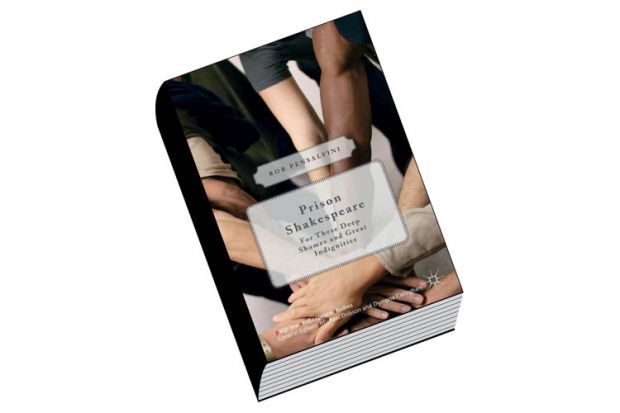On 4 June 1789, a group of convicts in Australia staged a performance of George Farquhar’s The Recruiting Officer. This production is the basis of Thomas Keneally’s The Playmaker, which itself is the source of Timberlake Wertenbaker’s Our Country’s Good, currently in production at the National Theatre. Reviewing that production, the critic Michael Billington referred to the “regenerative power of drama”. But what precisely is this power? How does it work? What are the most effective ways of deploying drama in penal settings? How are prison shows put together? What are the implications for prison conduct, discipline, punishment or recidivism?
In Prison Shakespeare, Rob Pensalfini addresses such questions; given the sequestered nature of the environment, this could be a fascinating topic. Unfortunately, having read his book, I am still in the dark. His conclusion is typical: with only four pages to go, he tells us, “it is possible that there is something inherent to Shakespeare’s texts that contributes uniquely to the prison environment”. “Possible”? “Something”? What? How? Why?
Visitors to rehearsal rooms may well have come across the occasionally nebulous formulations of some actors and directors on the cabalistic mysteries of their “art”. But there is no excuse for it in Pensalfini’s commentary, where the stakes are higher than a kind notice in The Stage. What Wertenbaker’s play shows, which Pensalfini fails to, is the struggle for culture, the effort of penal theatre as rehabilitation, education, recreation. It is just not enough to say that inmates are “ready to embrace the art of being” or that they are “inhabiting the text, and embodying the ideas and experiences it contains”. I’ve not a clue how that might work and I have no idea what it might mean.
The author’s repeated reliance on obscure technical language does nothing to help. We hear much of Augusto Boal’s Theatre of the Oppressed, which is fairly well known (although never explained), but then there is frequent mention of “Spolin’s games”; “Linklater’s philosophy”; “Forum theatre”; “Theatre of Empowerment”; “Cop in the Head”; “Image Theatre”; “Rainbow of Desire” and “conscientization”. There is no attempt to explain what any of these are or how they are practised.
Too often, tired theatrical jargon obscures the argument: Shakespeare engages his audience “with the complexity of the human condition”; “every word is there for a reason”; “aliveness and lightness”. I kept wanting to ask him: “But what is it you actually do faced with a dozen prisoners?” Elsewhere, there are apparently random discussions of Anglo-Saxon grammar, while the historical generalisations would be unacceptable in an undergraduate essay: “These two periods [the early modern and the contemporary], separated by 400 years, have more in common with one another, sociopolitically, than either has with the centuries that separate them. In short, we live in Shakespearean times.” In reality: no we don’t.
Moreover, Pensalfini’s snide remarks are unworthy of a scholarly work. In the 1991 Gulf War, Kuwait was “the innocent damsel in distress [and] the United States and its allies were the Hero”. The US reaction to 9/11 was disproportionate, he says. It may well have been, but not for the reason, as he argues, that in New York “fewer than 3,000 human lives” were lost. This book is vague, obscure, obtuse, stylistically inelegant and sometimes offensive. I’d sentence it to 25 years with hard labour.
Peter J. Smith is reader in Renaissance literature, Nottingham Trent University, and author of Between Two Stools: Scatology and its Representations in English Literature, Chaucer to Swift (2012, 2015).
Prison Shakespeare: For These Deep Shames and Great Indignities
By Rob Pensalfini
Palgrave Macmillan, 272pp, £55.00
ISBN 9781137450203 and 0227 (e-book)
Published 23 October 2015
Register to continue
Why register?
- Registration is free and only takes a moment
- Once registered, you can read 3 articles a month
- Sign up for our newsletter
Subscribe
Or subscribe for unlimited access to:
- Unlimited access to news, views, insights & reviews
- Digital editions
- Digital access to THE’s university and college rankings analysis
Already registered or a current subscriber?




